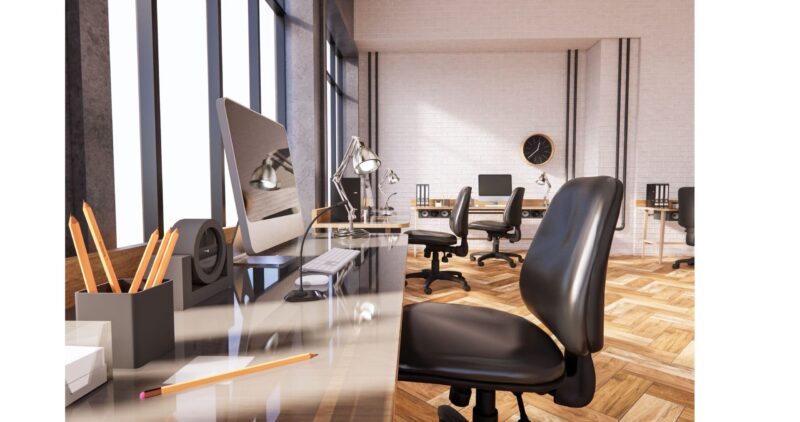A workplace that feels clean, orderly, and well-maintained directly impacts employee motivation and efficiency.
Staff spend hours every day inside offices, and the state of that environment affects focus, energy levels, and overall satisfaction.
Cleanliness influences both physical health and mental clarity, which makes it a vital element of workplace management.
Professional commercial cleaning ensures that every corner of the office meets hygiene standards that casual upkeep cannot achieve.
High-touch surfaces, shared kitchens, restrooms, and meeting rooms all require specialized attention.
A structured plan led by trained staff eliminates dust, bacteria, and allergens that reduce performance.
By outsourcing this responsibility, managers free employees to focus on tasks that truly drive business results.
The Link Between Cleanliness and Productivity
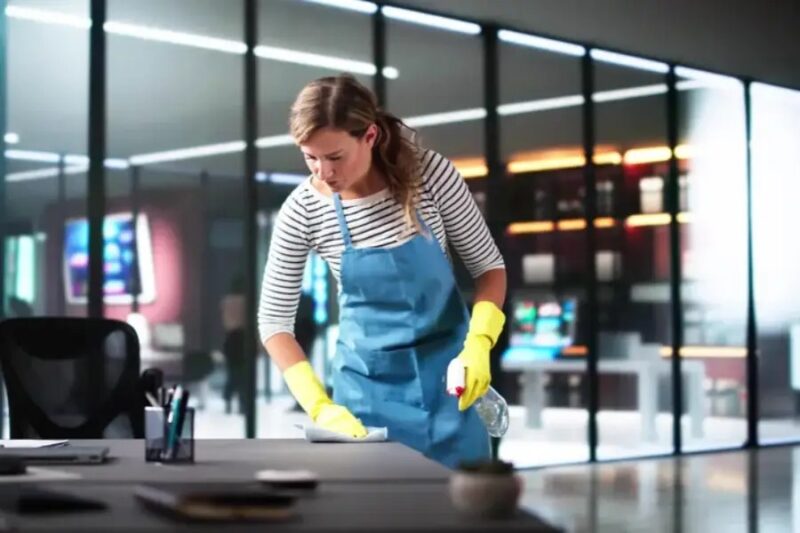
Research consistently shows that clean environments enhance concentration and efficiency.
Employees working in cluttered or dirty spaces face constant distractions, even if they do not consciously recognize them.
Dusty desks, overflowing bins, or grimy restrooms create stress that chips away at productivity.
By contrast, a clean space allows workers to focus on projects without discomfort.
Reduced absenteeism also plays a role. Offices with proper cleaning practices experience fewer outbreaks of colds and flu. Germs spread easily through door handles, phones, and breakrooms. Professional attention to sanitation keeps infection risks lower, ensuring that employees remain present and engaged.
Physical Health Benefits for Staff
Health represents one of the strongest arguments for professional cleaning. Dust accumulation worsens allergies and respiratory issues.
Poorly maintained kitchens and restrooms expose staff to harmful bacteria. Without consistent care, office air quality declines, which can lead to fatigue and headaches.
When professionals clean thoroughly, employees breathe cleaner air and work in safer spaces.
Tasks such as disinfecting workstations, sanitizing restrooms, and vacuuming carpets prevent illnesses.
Staff who feel physically comfortable are less likely to request sick leave and more likely to contribute consistently.
Mental Health and Workplace Morale
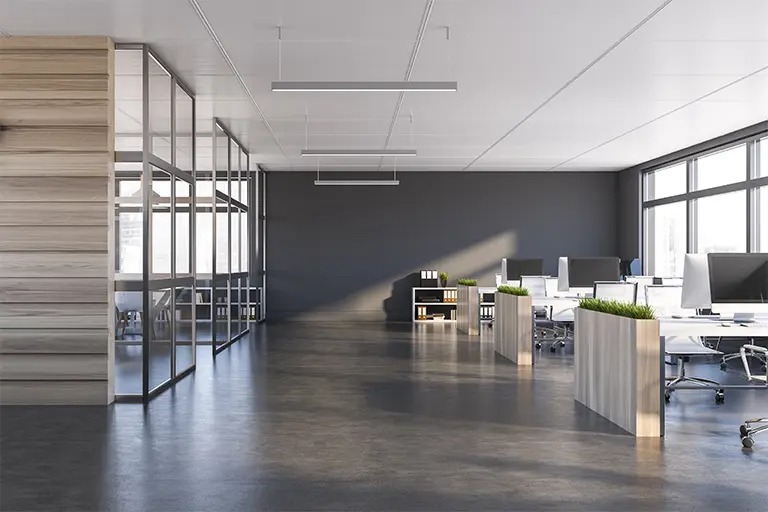
A clean environment provides psychological benefits as well. Clutter and mess create subconscious stress, while orderly surroundings promote calmness.
Employees working in neat offices report greater satisfaction with their jobs. They also express more pride in their workplace, which boosts morale and loyalty.
Clients and partners also notice the condition of an office. A clean and well-maintained space conveys professionalism and care, reinforcing trust.
Staff who work in such an environment feel proud to host visitors and confident in the image their company projects.
Key Areas That Require Professional Attention
Workstations
Individual desks are hotspots for germs due to constant use. Keyboards, mice, and phones harbor bacteria, especially when staff eat or drink at their desks.
Professional cleaners use safe disinfectants that eliminate germs without damaging equipment.
Restrooms
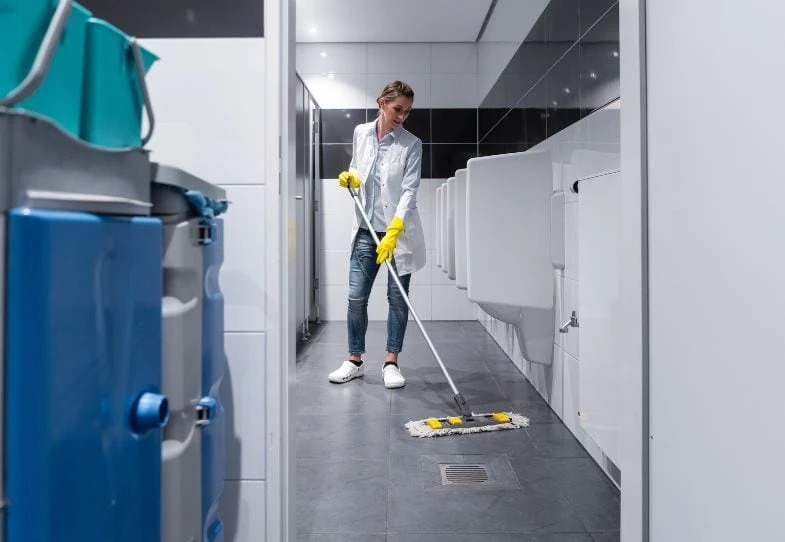
Restrooms require daily attention to maintain hygiene. Professional cleaners sanitize sinks, toilets, and counters while refilling essential supplies.
Floors are mopped with disinfectants, and high-touch areas like handles and partitions receive thorough cleaning.
Breakrooms and Kitchens
Shared kitchens accumulate spills, crumbs, and food residue quickly. Without daily care, they become breeding grounds for bacteria.
Professional cleaning keeps appliances, sinks, and counters sanitary. Employees benefit from a pleasant and safe space to enjoy meals.
Floors and Carpets
Floors collect dirt, dust, and allergens that reduce indoor air quality. Professional vacuuming and mopping keep surfaces safe and visually appealing.
Carpets also require periodic deep cleaning to remove embedded debris that regular vacuuming cannot reach.
Common Areas
Conference rooms and reception spaces reflect a company’s image. Clean tables, organized chairs, and dust-free shelves create a welcoming environment.
Professional cleaners ensure that shared zones stay presentable and hygienic.
The Role of Technology and Modern Methods
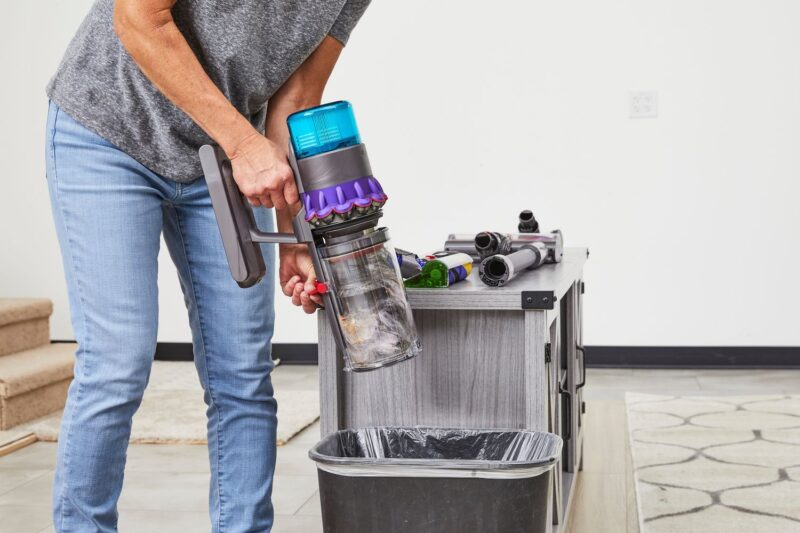
Cleaning today extends beyond simple sweeping and mopping. Professional companies employ advanced equipment and eco-friendly solutions.
High-efficiency vacuums with HEPA filters trap allergens effectively. Electrostatic sprayers distribute disinfectant evenly on surfaces.
Environmentally conscious businesses benefit from green cleaning products that avoid harsh chemicals.
This not only reduces environmental impact but also creates safer spaces for staff sensitive to strong cleaning agents. Modern practices balance thorough sanitation with sustainability.
Employee Participation and Shared Responsibility
Even with professional services, employees influence the state of their environment. Staff should be encouraged to wipe spills promptly, dispose of waste responsibly, and maintain personal desks.
Management can support this by providing sanitizing wipes and waste bins throughout the office.
Training sessions or posted reminders reinforce these practices. A collaborative approach ensures that cleaning standards remain consistent throughout the day, even between professional visits.
Advantages of Outsourcing Cleaning
Many businesses attempt to manage cleaning in-house but quickly discover challenges. Employees lack the time and expertise to handle detailed tasks.
Outsourcing ensures that trained professionals manage sanitation using proper techniques and tools.
The benefits of outsourcing include:
- Consistent and reliable cleaning schedules
- Access to specialized equipment and supplies
- Compliance with health and safety standards
- Reduced burden on employees and managers
- Professional results that enhance company image
Outsourcing also provides flexibility. Services can be tailored to daily, weekly, or monthly needs depending on the size of the workplace and foot traffic.
Long-Term Cost Savings
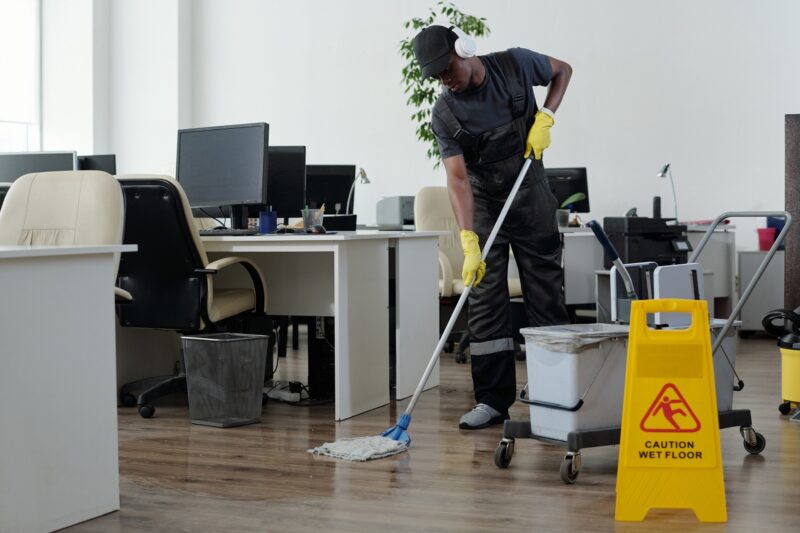
Professional cleaning reduces long-term expenses in several ways. Well-maintained carpets and furniture last longer.
Ventilation systems remain efficient when dust and debris are minimized. Fewer sick days mean higher productivity, which offsets service costs.
A clean office also prevents larger issues. For example, improper waste management can attract pests, leading to costly extermination.
Regular maintenance reduces such risks and helps companies avoid unplanned expenses.
Creating a Productive Culture
Cleanliness influences workplace culture. Employees notice when management invests in professional cleaning, and they interpret it as care for their well-being.
A tidy office promotes discipline, focus, and teamwork. Staff are more likely to maintain order in spaces that already look polished and cared for.
Visitors and new recruits also evaluate workplace culture based on appearance. A professional atmosphere enhances reputation, making it easier to attract top talent.
Clean offices stand out as desirable places to work.
A Practical Checklist for Managers
To maximize productivity, managers should combine professional services with internal practices. A simple checklist includes:
- Scheduling regular professional cleaning for all areas
- Monitoring restrooms, kitchens, and breakrooms throughout the day
- Supplying sanitizers, wipes, and bins for employee use
- Encouraging staff to maintain personal workstations
- Conducting periodic reviews of cleanliness standards
When leadership takes initiative, cleanliness becomes a shared value across the organization.
Conclusion
Professional office cleaning is not a luxury but a necessity for sustained productivity. A clean space protects health, improves morale, and reflects professionalism.
Commercial cleaning services provide expertise that goes beyond casual upkeep, ensuring that every area from restrooms to reception remains sanitary and inviting.
Employees working in clean environments experience fewer illnesses, higher satisfaction, and greater focus.
Companies benefit from reduced absenteeism, stronger performance, and an enhanced reputation. By combining professional services with responsible employee participation, businesses create a culture where cleanliness and productivity reinforce each other every day.

